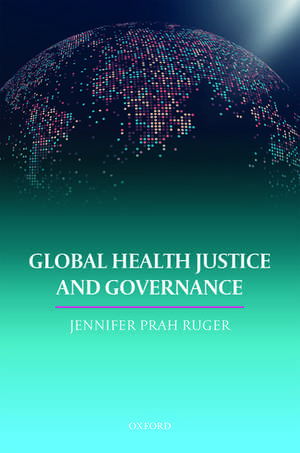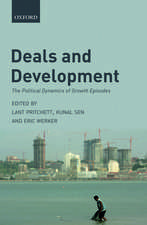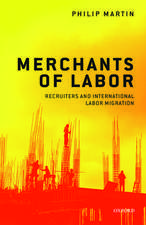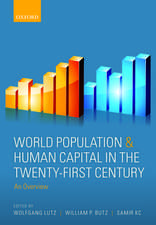Global Health Justice and Governance
Autor Dr. Prah Rugeren Limba Engleză Hardback – 23 mai 2018
Preț: 580.02 lei
Preț vechi: 785.18 lei
-26% Nou
Puncte Express: 870
Preț estimativ în valută:
110.98€ • 116.19$ • 91.83£
110.98€ • 116.19$ • 91.83£
Carte tipărită la comandă
Livrare economică 25-31 martie
Preluare comenzi: 021 569.72.76
Specificații
ISBN-13: 9780199694631
ISBN-10: 019969463X
Pagini: 426
Dimensiuni: 164 x 239 x 29 mm
Greutate: 0.8 kg
Editura: OUP OXFORD
Colecția OUP Oxford
Locul publicării:Oxford, United Kingdom
ISBN-10: 019969463X
Pagini: 426
Dimensiuni: 164 x 239 x 29 mm
Greutate: 0.8 kg
Editura: OUP OXFORD
Colecția OUP Oxford
Locul publicării:Oxford, United Kingdom
Recenzii
This book will be an invaluable resource to a range of intersecting readerships, including students, analysts, and policy makers in global health, global justice and global institutions. The author gives a comprehensive account of how the current system works, its shortcomings, principles for redesign, and practical ways forward. She brings rigorous scholarship to bear on one of the major policy issues of our time.
In this vigorously reasoned analysis of the injustices in the global health situation today, Jennifer Ruger provides both insightful causal investigations and identification of promising ways and means of overcoming the problems that have to be addressed. Combining conceptual and analytical concerns with critically assessed proposals of remedial reforms, Ruger has made a major advance towards a better understanding of some of the most distressing aspects of the unequal world in which we live. This is an essential reading not only for health care specialists but also for concerned citizens across the world.
At a time when many relatively poor countries have decided to move seriously towards Universal Health Coverage while a rich one is trying to move farther away from it, Ruger's encyclopedic treatise on the ethical, justice and global dimensions of healthcare is pertinent and illuminating.
Building on her influential health capability paradigm, Ruger here deepens its normative grounding, elaborates a global division of responsibilities for seeing to it that health justice is achieved, and pinpoints where the relevant agents are falling short on these responsibilities. She proposes and defends specific reforms of international law and of the ways that global institutions, nation states, and individuals go about securing health. Only Ruger, equally at home with foundational normative arguments, theories of governance, and epidemiology, could have built such a formidable and compelling edifice.
Jennifer Prah Ruger has launched nothing less than a devastating critique of the shameful way human society tolerates unequal life-chances and allocates health resources world-wide. Her vision of shared health governance will strike some as idealistic, but it is a bold moral response to the global patchwork-of-a-system that has left so many peopleâs lives at early risk.
Inequalities in health abound within and between countries and are the major challenge of global health. Why should we act on them, and how should we bring various actions together? This work of both humanity and truly impressive scholarship puts human capabilities and flourishing at the centre and builds outwards. It is exactly the book I needed to give both theoretical structure and practical action for global health.
In this vigorously reasoned analysis of the injustices in the global health situation today, Jennifer Ruger provides both insightful causal investigations and identification of promising ways and means of overcoming the problems that have to be addressed. Combining conceptual and analytical concerns with critically assessed proposals of remedial reforms, Ruger has made a major advance towards a better understanding of some of the most distressing aspects of the unequal world in which we live. This is an essential reading not only for health care specialists but also for concerned citizens across the world.
At a time when many relatively poor countries have decided to move seriously towards Universal Health Coverage while a rich one is trying to move farther away from it, Ruger's encyclopedic treatise on the ethical, justice and global dimensions of healthcare is pertinent and illuminating.
Building on her influential health capability paradigm, Ruger here deepens its normative grounding, elaborates a global division of responsibilities for seeing to it that health justice is achieved, and pinpoints where the relevant agents are falling short on these responsibilities. She proposes and defends specific reforms of international law and of the ways that global institutions, nation states, and individuals go about securing health. Only Ruger, equally at home with foundational normative arguments, theories of governance, and epidemiology, could have built such a formidable and compelling edifice.
Jennifer Prah Ruger has launched nothing less than a devastating critique of the shameful way human society tolerates unequal life-chances and allocates health resources world-wide. Her vision of shared health governance will strike some as idealistic, but it is a bold moral response to the global patchwork-of-a-system that has left so many peopleâs lives at early risk.
Inequalities in health abound within and between countries and are the major challenge of global health. Why should we act on them, and how should we bring various actions together? This work of both humanity and truly impressive scholarship puts human capabilities and flourishing at the centre and builds outwards. It is exactly the book I needed to give both theoretical structure and practical action for global health.
Notă biografică
Dr.Prah Ruger is a leading scholar of global and domestic health policy and public health. She is currently the Amartya Sen Professor of Public Health Equity, Economics, and Policy; Associate Dean for Global Studies; and Faculty Chair at the Center for High Impact Philanthropy, all at the University of Pennsylvania. Dr. Ruger has authored over 100 publications and is internationally recognized for her leadership and work, which has been cited by the United Nations, World Bank, World Health Organization and United States Government.





















